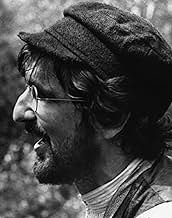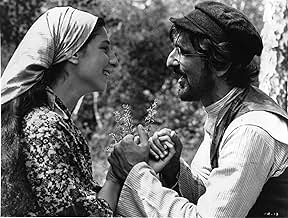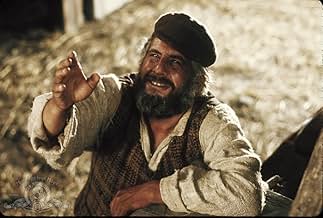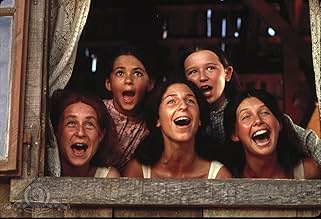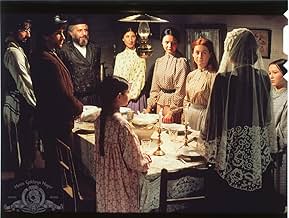En la Rusia prerrevolucionaria, un campesino judío con valores tradicionales se enfrenta a casar a tres de sus hijas con ideales románticos modernos mientras el creciente sentimiento antisem... Leer todoEn la Rusia prerrevolucionaria, un campesino judío con valores tradicionales se enfrenta a casar a tres de sus hijas con ideales románticos modernos mientras el creciente sentimiento antisemita amenaza a su pueblo.En la Rusia prerrevolucionaria, un campesino judío con valores tradicionales se enfrenta a casar a tres de sus hijas con ideales románticos modernos mientras el creciente sentimiento antisemita amenaza a su pueblo.
- Dirección
- Guión
- Reparto principal
- Ganó 3 premios Óscar
- 10 premios y 14 nominaciones en total
Paul Michael Glaser
- Perchik
- (as Michael Glaser)
Ray Lovelock
- Fyedka
- (as Raymond Lovelock)
Reseñas destacadas
I know people have complained about the length of this movie. Yeah, it is long, three hours approximately, but there are so many things that compensate. Norman Jewison's direction is very good, and the film is stylishly filmed, with some nice cinematography and there are nice scenery and costumes. The choreography is great, energetic in parts and graceful in others. Next, the music is outstanding. The incidental music largely reminiscent of Russian folk music is a real treat, but the songs are outstanding. The beautiful "Sunrise, Sunset", the fun "Tradition", the idealistic "Match Maker" and the energetic "If I Were A Rich Man", all amazing. Also, Topol, what an absolutely brilliant performance. He put body and soul into Tevye, successfully mixing humour, wisdom and poignancy and the result is one of the most memorable performances in any musical to grace our screens. All the other performances are wonderful, I liked it all five daughters had distinct personalities, and Norma Crane is fantastic as the mother. The story is both tight and poignant, about a milkman of Jewish values, who wishes his five daughters to marry. In conclusion, wonderful and definitely memorable. 10/10 Bethany Cox
I LOVE this musical but I weep a little always for the Yiddish culture lost forever. The world is so much poorer.
I apologise for straying from the artistic merit to linger on the loss to Humanity
Nevertheless this film is a permanent record of the fact that we enjoyed a wondrous Yiddish culture in our midst in Europe but after a series of Pogroms culminating in the Holocaust the heart was ripped out of our culture here in Europe
The music, the humour, the humanity, gone forever from the Heart of Europa. Europe's loss
Irish Gentile
I apologise for straying from the artistic merit to linger on the loss to Humanity
Nevertheless this film is a permanent record of the fact that we enjoyed a wondrous Yiddish culture in our midst in Europe but after a series of Pogroms culminating in the Holocaust the heart was ripped out of our culture here in Europe
The music, the humour, the humanity, gone forever from the Heart of Europa. Europe's loss
Irish Gentile
In pre-revolutionary Russia, a poor Jewish peasant (Topol) must contend with marrying off his three daughters while antisemitic sentiment threatens his home.
Let me say this right of the bat: while this film may focus on a Jewish family and their struggle to enter the modern world (which may be good or bad), you certainly do not need to be Jewish to enjoy it. I always felt like this film (and "Yentl") were marketed towards the Jewish community, but it need not be. It is just a great story with excellent songs.
I loved the singing, the dancing, the story, the humor, the characters... there was really nothing I disliked about it. I was a bit surprised the eldest daughter was not Barbra Streisand, because they look identical. But, oh well. And I am also a bit surprised that the director was not Jewish, especially with a name like Jewison... but hey, he did a marvelous job!
Let me say this right of the bat: while this film may focus on a Jewish family and their struggle to enter the modern world (which may be good or bad), you certainly do not need to be Jewish to enjoy it. I always felt like this film (and "Yentl") were marketed towards the Jewish community, but it need not be. It is just a great story with excellent songs.
I loved the singing, the dancing, the story, the humor, the characters... there was really nothing I disliked about it. I was a bit surprised the eldest daughter was not Barbra Streisand, because they look identical. But, oh well. And I am also a bit surprised that the director was not Jewish, especially with a name like Jewison... but hey, he did a marvelous job!
Opening with the wonderful song "Tradition" which is the overriding theme of the entire musical, with its comedy and its pain, this film is a charming, sentimental telling of the lives and tribulations of a family. The beauty of it is that despite occasional violence against a people, they maintain their spirit through the ages. It's about what every father believes, "There is no one adequate to marry my daughter." Things happen and people get knocked down, and eventually everyone gets to his feet once more. There is the combative relationship between Tevye and his wife, and their love ("but do you love me") that goes pretty much unstated. In the end they continue to stand tall together because what they have put into the world is true love, not the overly dramatic, silly love that permeates our world today. See the movie. See the stage play. You will always leave with an optimistic spring in your step, and wonderful songs in your heart.
The story took place in the village of Russia, 1904. It centered around the leading role, Tevya, who was diaryman. Tevya was a enlightened old man, he had open-minded thought and he deeply loved his three daughters. When he looked into the future of the daughters who were unmarried, he always sang the song "If I am the rich" very kindly, because he fervently expected that they got a bright future.
In the beginning, Tevya was trying to marry off Tzietel, the oldest daughter. The matchmaker found her a matcher in Lazar Wolfm the butcher. However, the butcher was much older than Tzietel, and she didn't love him. she loved a poor tailor, and they promised to each other that they would get married. At last Tevya said yes to them. Meanwhile the second child Hodel, and a poor student also fell in love soon, and they got engaged. They informed her father this and he gave them permission to be married. The poor student was arrested for demonstrating, and was sent to a distant prison, Hodel left to join there. Last, the last daughter , Chava and Fyedka fell in love. Chava told Tevya, and he was outraged, because she wanted to marry out of the faith. She got married anyway, and Tevya disowned her. Soon after that, all of the Jewish people in Anatevka got a notice to move out. And that's the end of the play. Ir's a kind of sad ending.
In the beginning, Tevya was trying to marry off Tzietel, the oldest daughter. The matchmaker found her a matcher in Lazar Wolfm the butcher. However, the butcher was much older than Tzietel, and she didn't love him. she loved a poor tailor, and they promised to each other that they would get married. At last Tevya said yes to them. Meanwhile the second child Hodel, and a poor student also fell in love soon, and they got engaged. They informed her father this and he gave them permission to be married. The poor student was arrested for demonstrating, and was sent to a distant prison, Hodel left to join there. Last, the last daughter , Chava and Fyedka fell in love. Chava told Tevya, and he was outraged, because she wanted to marry out of the faith. She got married anyway, and Tevya disowned her. Soon after that, all of the Jewish people in Anatevka got a notice to move out. And that's the end of the play. Ir's a kind of sad ending.
¿Sabías que...?
- CuriosidadesThe "Sunrise, Sunset" scene was not lit by electric movie lights but by hundreds of candles, by Cinematographer Ossie Morris. Years later, Norman Jewison said it was the best lit scene in any of his films.
- PifiasWhen the old man is talking to Tevye about Tzeitel, the shadow of the microphone boom is visible on the old man's shirt.
- Créditos adicionalesTopol and the cast sing "Tradition" without any opening credits rolling. At the end of the number, the fiddler standing on the left of the screen launches into an extensive solo while the opening credits roll on the right of the screen.
- Versiones alternativasOriginally released at 181 minutes (with an intermission); later trimmed for 1979 reissue to 149 minutes.
- ConexionesEdited into 5 Second Movies: Fiddler on the Roof (2008)
- Banda sonoraTradition
(1964) (uncredited)
Music by Jerry Bock
Lyrics by Sheldon Harnick
Performed by Topol and Chorus in the pre-credits sequence
Selecciones populares
Inicia sesión para calificar y añadir a tu lista para recibir recomendaciones personalizadas
Everything New on Prime Video in July
Everything New on Prime Video in July
Your guide to all the new movies and shows streaming on Prime Video in the US this month.
Detalles
- Fecha de lanzamiento
- País de origen
- Idiomas
- Títulos en diferentes países
- El violinista a la teulada
- Localizaciones del rodaje
- Lekenik, Croatia(Anatevka)
- Empresas productoras
- Ver más compañías en los créditos en IMDbPro
Taquilla
- Presupuesto
- 9.000.000 US$ (estimación)
- Recaudación en Estados Unidos y Canadá
- 10.404.330 US$
- Fin de semana de estreno en EE. UU. y Canadá
- 1.726.942 US$
- 11 nov 1979
- Recaudación en todo el mundo
- 10.407.890 US$
- Duración3 horas 1 minuto
- Color
- Relación de aspecto
- 2.35 : 1
Contribuir a esta página
Sugerir un cambio o añadir el contenido que falta

Principal laguna de datos
By what name was El violinista en el tejado (1971) officially released in India in Hindi?
Responde





